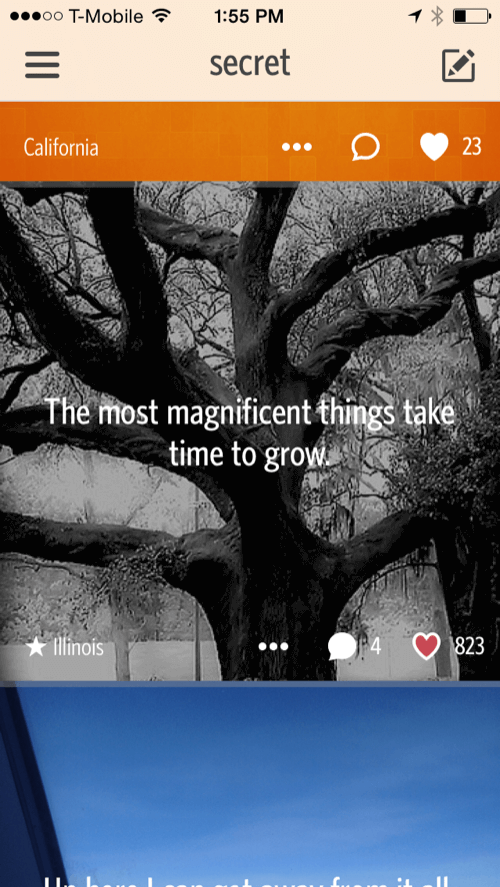Until recently, I kept all my secrets to myself.
Sometimes I want to share my thoughts online, but find them too personal for Twitter, and not necessarily appropriate for Facebook. I want to share these thoughts anonymously, either because they’re raw emotions, or because I find them embarrassing for some reason, even if they’re funny and true.
But then there’s Secret, the anonymous social networking app. Its notes and rumors have led technology reporters like me on wild goose chases, trying to confirm bits of gossip, from the true (“Nike is shutting down their wearables division”) to the false (“Evernote is getting acquired”), sparking heated debates among entrepreneurs and investors.
See also: How To Remove Yourself From The Internet
Secret is a bit like a high school bathroom stall, where anonymous comments are etched with the tips of sharp pens, but carry questionable legitimacy.
When Secret launched in January, early adopters were mainly the tech elite, journalists, startup founders and Facebook or Google employees seeking an outlet for gossip, snark and the occasional lie. My Secret feed—formed by posts from friends in my phone book, posts they had liked, or posts near me—was an endless stream of garbage about funding rounds, sexual conquests, or outright character assassinations (and even gossip about some of my good friends).
But then something happened. When Secret began reaching iPhone users outside of Silicon Valley and New York, the Secrets changed. No longer were they all immature; Secrets had developed feelings, and felt more human. I saw requests for prayer, professions of love, and pictures of cancer-free medical scans. They were honest-to-goodness Secrets, and I felt myself slowly becoming a fan of the application I loathed so much at first.
Some of the trash still lingers, but Secret is beginning to become an anonymous application that can be a vehicle for good.
Secret’s founders want it to be a safe place where people can talk anonymously without receiving flak from friends or family like they might on Facebook or Twitter. Its vision falls in line with other anonymous apps, most notably Whisper, an application that has allegedly saved someone from suicide.
At the South By Southwest festival in March, Secret cofounder David Byttow said, “We don’t have to be nice, but we should be kind.” I initially scoffed at this idea, thinking it was completely naive, but now it makes sense. It’s cathartic to surrender your own secrets, and to read others. But there’s also an element of Schadenfreude that will never really go away.
Breaking Up With Our Social Identity

On social networks like Facebook and Twitter, we are increasingly tied to our real-world identities, whether we use pseudonyms or not. We share our thoughts and feelings, and our friends and followers can see and comment on what we say. We appear in online searches, and our words or pictures are saved to social networks, forever aligning us with things we’ve said or done over the years, even if they’re trivial or awkward.
As more companies begin to adopt social logins for products and services, not only are your life’s conversations a part of the online social fabric, but so are your purchases, movements, and Likes. Facebook, for instance, is poised to integrate with everything, and uses your personal information to sell advertising. Twitter, in its quest to be like Facebook, hopes to do the same.
There have always been options to remain anonymous, or at least pseudonymous, online, but all of your conversations are usually associated with a username. Anonymous applications, on the other hand, ditch the necessity of usernames altogether: No one can follow all your posts or comments, it’s just you and a bunch of other anonymous strangers sharing your thoughts.
With Secret, you can share as much or as little as you want anonymously—though your friends from your address book that also have Secret will be notified when “a friend” posts. Comments are anonymous, too. Tiny icons identify the same commenter in a thread, but they change with each post, so no one can tell which secrets you share, or which you comment on.
On anonymous apps like Secret and Whisper, you don’t have an identity, and your Internet history doesn’t haunt you in the form of advertising.
Overcoming Challenges

It’s doubtful anonymous applications will ever be as popular as other mobile apps like Instagram or Snapchat.
Secret, available only for iOS, is ranked fairly low in the App Store—it’s No. 97 in the U.S. for social networking. Whisper, almost a full year older than Secret, is more popular as the No. 35 social networking app in the US.
The great challenge with anonymous apps is to add new users, but also convince people they’re not mobile versions of a Burn Book. If people can’t keep their posts clean, harm and gossip could eat these apps and alienate those users that use these platforms as places of refuge, not resentment.
PostSecret is a perfect example of how an anonymous mobile app can fail. As a website and art project, PostSecret.com features postcards with images, drawings, and admissions from people all around the world. Anonymous writers submit their thoughts and feelings to the PostSecret blog, and the moderator publishes selections for the world to enjoy.
PostSecret launched a mobile application in late 2011 that took out the middleman—the moderator—and let users post their own secrets directly to an app. It cost $1.99 and was extremely short-lived. The app was shut down in January 2012 after users, moderators and the creator’s family were threatened. The website, however, is still running today.
Navigating moral issues and privacy is something anonymous apps will have to contend with. Secret is dealing with that by taking down destructive posts and letting users flag posts as inappropriate. But some high-profile people don’t think that’s enough.
Marc Andreessen, Netscape founder and Silicon Valley investor, went on a Twitter rant last month bashing anonymous apps.
“Such experiments start out as naughty fun, end with broken hearts and ruined lives. In the end everyone regrets participating in them,” Andreesen wrote.
Secret was also blamed for sparking the drama surrounding a prominent engineer’s departure from GitHub and the maelstrom of bad press that followed.
In order for Secret or Whisper to avoid the same fate as PostSecret, it will have to heavily monitor posts to prevent harmful posts from spreading. Of course, gossip, whether true or not, will always spread, and any platform that makes it easier will be filled with it.
How Anonymity Could Succeed
Now more than ever consumers are worried about their privacy online, so if there’s an optimal time for anonymous apps to make it into our mobile devices, it’s now.
Even Facebook CEO Mark Zuckerberg appears to be warming up to the idea of online anonymity, having “talks” with Secret that have spurred rumors of an acquisition.
But if Secret wants to become part of my regular app repertoire, a number of personalization filters need to be implemented. For instance, I should be able to block certain words or phrases like “Threesomes” and “Y Combinator” from showing up in my feed. Additionally, the ability to opt out of sending friends notifications when you post would encourage me to write more secrets.
Eventually, Secret’s algorithms should begin to learn the type of posts I enjoy—for instance, ones containing positive or humorous sentiment—it could show me more of those, while hiding negative, un-funny posts lower in the feed.
There are many Secret topics I’d like to avoid, but also some I want to follow; I imagine I’m not the only one. If topics were searchable or tagged, people could follow certain Secrets and create anonymous support groups for themselves.
Moms are a great example. Many women probably experience negative aspects of motherhood but feel guilty writing about it anywhere online. With Secret, they can post their complaints as easy as sending a text message to their best friend, and they won’t be judged for complaining about their screaming toddler.
It’s easy to scoff at anonymous apps when our own feeds are filled with filth. But as I’ve learned (and come to enjoy), when anonymous, humans have equal capacity to be supportive and cruel. And once app makers allow the cruelty to be filtered out, anonymous apps can become the public diaries we always wanted, all the while keeping our pen names private.
Lead image courtesy of Mack Male on Flickr. All other images screenshots from Selena Larson’s Secret app.










